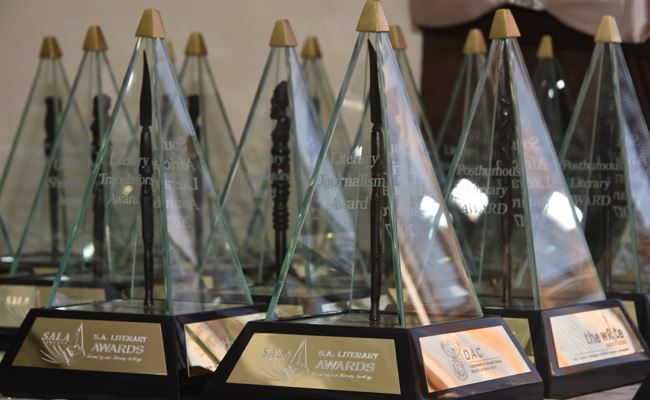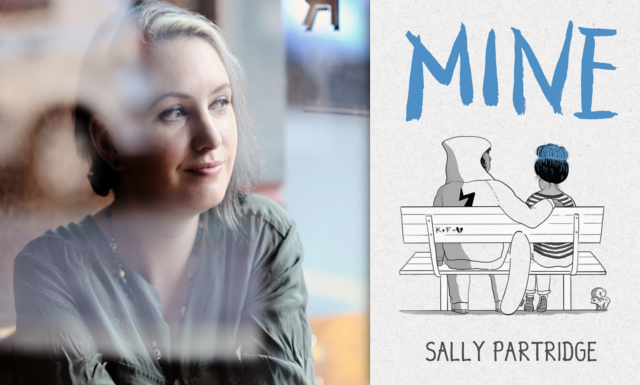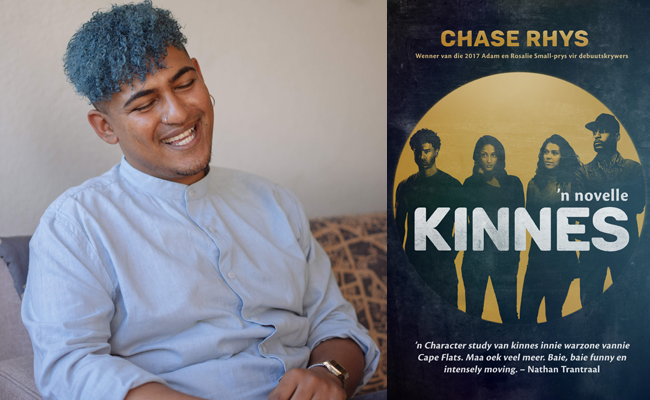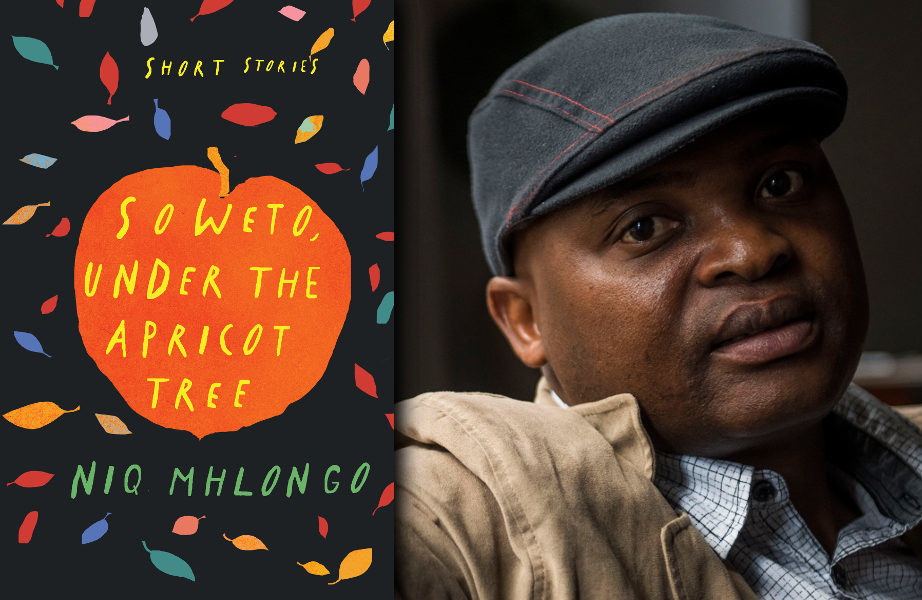
The winners of the 2019 South African Literary Awards (SALA) were announced on Thursday, November 7, at a ceremony held in Johannesburg. Winners were announced for thirteen categories, ten of which were competitive.
SALA was founded in 2005 by the wRite Associates – an events and project management company that focuses on the arts, culture, and heritage – in partnership with the South Africa’s National Department of Arts and Culture. The aim of SALA is to celebrate the literary excellence of South Africa in all of the nation’s languages.
Here is the full list of this year’s winners, with descriptions of their books or their biographies:
Children’s Literature Award
Lebohang Masango, for Mpumi’s Magic Beads (2018), in English
From Lebohang Masango’s website:
Mpumi’s Magic Beads is a delightful story about friendship, self-esteem, discovery and beautiful hair in the big city of Joburg. It follows the sudden adventures of Mpumi, Asante and Tshiamo as they see the world around them from new heights and realise all of the fun waiting to be discovered outside of their classroom.
Youth Literature Award
Sally Partridge, for Mine (2018), in English
From PEN South Africa:
Mine is the roller coaster love story of Finley September and Kayla Murphy, two teenagers trying to make sense of their lives in the mother city. In each other they find that all-for-nothing love they’ve been searching for – but also a sense of belonging. Until the ghosts from their past emerge to try and break them apart.

First-time Published Literary Award
Bongani Nggulunga, The Man Who Founded the ANC: A Biography of Pixley Ka Isaka Seme (2017), English
From Amazon.com:
This book discusses in detail Seme’s extraordinary life, from his humble beginnings at Inanda Mission to his triumphs and disappointments across the continents, in his public and private life. When Seme died in 1951 he was bankrupt and his political standing had suffered greatly. And yet he was praised as one of the greatest South Africans ever to have lived. For all this, he has largely been forgotten. This biography brings the remarkable life of this extraordinary South African back to public consciousness.
Poetry Award
Tony Ullyatt, An Unobtrusive Vice (2018), English
From Dryad Press:
Tony Ullyatt’s collection evidences a strong poetic art displaying a variety of techniques. The collection contains engaging ekphrastic verse and investigates the impact of a personal history in gripping family portraits. There is discourse with other poets and cynical, distanced love poems; all neatly wrapped up in a masterful play with words. – Joan Hambidge
Nathan Trantraal, Alles het niet kom wôd (2017), Afrikaans
From NB Publishers:
A new collection by a controversial Afrikaans poet. In Alles het niet kom wôd Nathan Trantraal writes with the same vigour and enthusiasm of his debut, Chokers en survivors. While the poems in Trantraal’s new collection deal with class, race, politics, and Afrikaans as language, the poet now takes issue with themes of sexuality, as well as the particular religious and urban milieu of his childhood. An autobiographical and powerful collection by the winner of the 2015 Ingrid Jonker Prize.
Ayanda Billie, Umhlaba Umanzi (2016), isiXhosa
From Herald Live:
Umhlaba Umanzi, which means ‘the soil is wet,’ is a collection of Xhosa poetry, Billie said. ‘It’s also about the sadness that’s in our township, and the Marikana massacre, as well as about the plight of factory workers.’
K. Sello Duiker Memorial Literary Award
Chase Rhys, Kinnes (2018), Afrikaans
From Herald Live:
[Kinnes] is written in colloquial Afrikaans with English thrown in, giving an authentic Capetonian feel. It might not be the easiest read for those not familiar with the dialect, but Rhys’s use of language it gives the book a depth that could not be achieved any other way. Following the journey of matric couple, Nicole Lamb and Derick Delcarme, “Cape Kardashian” Rolanda Ficher, gang leader Anwaar “Ahnie” Brandt and the people in their lives, Rhys lets you discover and understand a single story from various viewpoints. He also goes back looks at the previous generations and how everyone eventually ended up in their various roles.

Novel Award
Charl-Pierre Naudé, Die ongelooflike onskuld van Dirkie Verwey (2018), Afrikaans
From Readers’ Warehouse:
On a day in the early seventies, the community of a small town in the Northern Cape notices a building on what was once barren ground. But three weeks later, the building disappears . . . Read about the bizarre realities of people who live more than once, the unphotographable young man, and the intense romantic relationship between two people who only met for a few seconds.
Sabata-mpho Mokae, Moletlo wa Manong (2018), Setswana
From Books LIVE:
…Moletlo wa Manong means “A Feast of the Vultures.” […] The story is set in a newsroom in the city of Kimberley. The protagonist, legendary journalist Otsile Mothibi, is investigating corruption in the post-apartheid administration. Top politicians are taking bribes for a lucrative vehicle rental tender and he is going to expose them. In the course of the investigation, one of his colleagues sells him out to the same politicians he is investigating. The story gets messy when politicians offer his unemployed but educated wife a position in a government department on condition that he drops the investigation. Otsile refuses to drop the investigation, which causes unhappiness in his household and puts his life and that of his wife in danger. His main source, an ambitious politician who is eyeing a leadership position, dies mysteriously after a meeting with him. Lives are threatened, phones are bugged, fear and mistrust enter the newsroom. Otsile likens the corrupt politicians as vultures who are making a feast of the country and his duty is to end the feast. The story ends with a hostage situation and a suicide as the corrupt politicians are cornered by the police.
Nadine Gordimer Short Story Award
Niq Mhlongo, Soweto, Under the Apricot Tree (2018), English
From Amazon.com:
‘This apricot tree has multiple souls that fill me with wonder every morning and enchant me by afternoon. This tree has bitter-sweet memories, just like the fruit it bears.’ If the apricot trees of Soweto could talk, what stories would they tell? This short story collection provides an imaginative answer. Imbued with a vivid sense of place, it captures the vibrancy of the township and surrounds. Told with satirical flair, life and death are intertwined in these tales where funerals and the ancestors feature strongly; where cemeteries are places to show off your new car and catch up on the latest gossip.

Creative Non-Fiction Literary Award
Jonathan Jansen, As by Fire: The End of the South African University (2017), English
From Amazon.com:
What are the real roots of the student protests of 2015 and 2016? Is it actually about fees? Why did the protests turn violent? Where is the government while the buildings burn? Former Free State University vice-chancellor Jonathan Jansen delves into the unprecedented disruption of universities that caught South Africa by surprise. In frank interviews with eleven of the VCs most affected, he examines the forces at work, why the protests escalate into chaos, and what is driving – and exasperating – our youth. This urgent and necessary book gives us an insider view of the crisis, tells us why the conflict will not go away and what it means for the future of our universities.
Literary Translator’s Award
Michiel Heyns, for Red Dog (2018), the English translation of Willem Anker’s Afrikaans novel Buys (2014)
From Amazon.com:
Coenraad de Buys was the most dangerous man around in the Cape of the late 1700s. At eight he crossed his first frontier and left his mother’s house behind. Left his home (the first of many); left the Cape; left civilisation. From the Langkloof, Buys roves – a giant, a legend, polygamist and swindler; the bane of government, father to chieftains and a Buysvolk of his own. Everywhere his wild oats are sown; everywhere renegades and criminals join his band of outcasts. He interprets between Xhosa and English but speaks only his own words. And everywhere on his travels, always there is the pack of dogs and the earless red leader that put Buys on his restless path. In Buys’ tracks, in his head, around his camp fires the slavering jaws snap. He was born in the Langkloof. He died on the banks of the Limpopo. But Buys is not dead.
Literary Journalism Award
Jennifer Malec, English
From Open Book Festival:
Jennifer Malecis the editor of The Johannesburg Review of Books, the publisher of The Reading List, and the former editor of Books LIVE. She has an MA from UCT and spent a number of years as a soccer journalist. Her writing has appeared in Aerodrome and the Sunday Times.
Wamuwi Mbao, English
From Open Book Festival
Wamuwi Mbao is a literary critic and cultural studies scholar. His short stories have been published in various collections. He lectures at Stellenbosch University on the practice of literary criticism and post-transitional South African subjectivities.
Lifetime Achievement Award
Louise Smit, Afrikaans
From Human & Rousseau:
Louise Smit lives in Pringlebaai. She became well known for her very successful TV productions such as Wielie Walie, Haas Das se Nuuskas, Pumpkin Patch, Kideo, Mina Moo and many more. She is also the author of Die Bybel vir kleuters/The Bible For Children and Professor Fossilus en die dinosourusse. Louise received national and international acclaim for her work and was awarded three Artes Awards, the Star Tonight Award, Prix Jeunesse and The Tokyo Prize
Cornelius Tennyson Daniel Marivate, Xitsonga
From For a Change
Cornelius Tennyson Daniel Marivate is South Africa’s leading authority on the literature and folksongs of his own Tsonga people. He was born and brought up on a Swiss mission station close to the Mozambique border in South Africa’s Northern Province.
Posthumous Literary Award
Cyril Lincoln Sibusiso Nyembezi
From Natalia:
Professor Cyril Lincoln Sibusiso Nyembezi, writer, lexicographer and humanitarian, was born in Babanango on December 6, 1919. […] As a writer, he was best known for his novel Inkinsela YseMgungungdlovu (The Tycoon of Maritzburg) which was adapted for television and became a popular series on Radio Zulu. In all, he wrote over twenty books, including two other novels and several volumes of poetry. He edited several anthologies and translated Alan Paton’s Cry, the Beloved Country into Zulu. He also compiled two dictionaries – The Compact Zulu Dictionary and Scholars Zulu Dictionary – with G. R. Dent. In 1992 came his definitive Zulu dictionary Isichazimazwi Sanmuhla Nangomuso.
Chairperson’s Award
Lindiwe Mabuza
From South African History Online:
Lindiwe Mabuza is a poet who has served as the African National Congress’ Chief Representative to Sweden and the United States, as well as the South African Ambassador to Germany. She garnered international support for the liberation struggle, working for economic sanctions and cultural boycotts. As a writer, Mabuza also used her skill with the written word to take part in multiple collections meant to empower South African women writers such as Malibongwe and One Never Knows.
Congratulations to all winners!








COMMENTS -
Reader Interactions